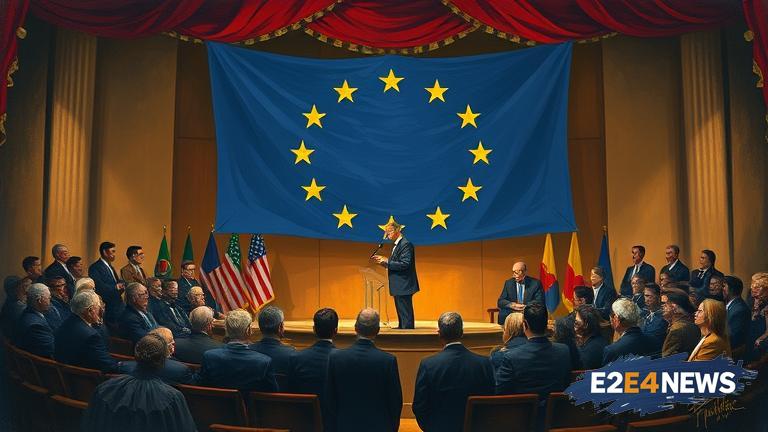The European Union has made a significant pledge to invest $750 billion in energy, a move that has been perceived as a direct response to the US’s growing influence in the global energy market. This massive investment is aimed at reducing the EU’s reliance on fossil fuels and promoting the use of renewable energy sources. However, critics argue that this pledge is nothing more than a political stunt, designed to bolster the EU’s reputation as a leader in the fight against climate change. The EU’s energy policy has been under scrutiny in recent years, with many questioning the effectiveness of its measures to reduce carbon emissions. Despite this, the EU remains committed to its goal of becoming carbon neutral by 2050. The $750 billion pledge is a significant step towards achieving this goal, but it remains to be seen whether it will be enough to make a meaningful impact. The EU’s energy market is complex and multifaceted, with many different players and interests at stake. The pledge has been welcomed by many in the renewable energy sector, who see it as a major opportunity for growth and investment. However, others have expressed concerns about the potential impact on the EU’s economy and the competitiveness of its industries. The US has been watching the EU’s energy policy with interest, and some have speculated that the $750 billion pledge is a direct response to the US’s growing influence in the global energy market. The US has been actively promoting its own energy exports, particularly in the form of liquefied natural gas (LNG). The EU’s pledge can be seen as a way of countering this influence and promoting its own energy security. However, others argue that the pledge is simply a publicity stunt, designed to distract from the EU’s lack of progress on reducing carbon emissions. The EU’s energy policy has been criticized for being overly reliant on natural gas, which is a fossil fuel that contributes to climate change. The $750 billion pledge does include measures to promote the use of renewable energy sources, such as wind and solar power. However, it remains to be seen whether these measures will be enough to make a meaningful impact. The EU’s energy market is subject to a complex array of regulations and policies, which can make it difficult to navigate. The $750 billion pledge is a significant step towards simplifying this landscape and promoting investment in renewable energy. However, it will require careful planning and implementation to ensure that it is effective. The EU’s energy policy is not just about reducing carbon emissions, but also about promoting energy security and competitiveness. The $750 billion pledge is a significant step towards achieving these goals, but it will require careful consideration of the potential impacts on the EU’s economy and industries. The US has been actively promoting its own energy policy, which includes measures to promote the use of fossil fuels. The EU’s $750 billion pledge can be seen as a way of countering this influence and promoting its own energy security. However, others argue that the pledge is simply a publicity stunt, designed to distract from the EU’s lack of progress on reducing carbon emissions. The EU’s energy policy has been criticized for being overly reliant on natural gas, which is a fossil fuel that contributes to climate change. The $750 billion pledge does include measures to promote the use of renewable energy sources, such as wind and solar power. However, it remains to be seen whether these measures will be enough to make a meaningful impact. The EU’s energy market is subject to a complex array of regulations and policies, which can make it difficult to navigate. The $750 billion pledge is a significant step towards simplifying this landscape and promoting investment in renewable energy. The EU’s energy policy is a complex and multifaceted issue, with many different players and interests at stake. The $750 billion pledge is a significant step towards promoting energy security and competitiveness, but it will require careful planning and implementation to ensure that it is effective. The EU’s commitment to reducing carbon emissions is clear, but the $750 billion pledge is just one part of a larger strategy. The EU will need to continue to work towards promoting renewable energy sources and reducing its reliance on fossil fuels if it is to achieve its goal of becoming carbon neutral by 2050. The $750 billion pledge is a significant step towards achieving this goal, but it is just one part of a larger journey. The EU’s energy policy will continue to evolve and adapt in the coming years, and it remains to be seen whether the $750 billion pledge will be enough to make a meaningful impact. The EU’s energy market is a complex and dynamic landscape, and the $750 billion pledge is just one part of a larger story. The EU’s commitment to promoting energy security and competitiveness is clear, but the $750 billion pledge is just one step towards achieving this goal. The EU will need to continue to work towards promoting renewable energy sources and reducing its reliance on fossil fuels if it is to achieve its goal of becoming carbon neutral by 2050. The $750 billion pledge is a significant step towards achieving this goal, but it is just one part of a larger journey. The EU’s energy policy will continue to evolve and adapt in the coming years, and it remains to be seen whether the $750 billion pledge will be enough to make a meaningful impact.
